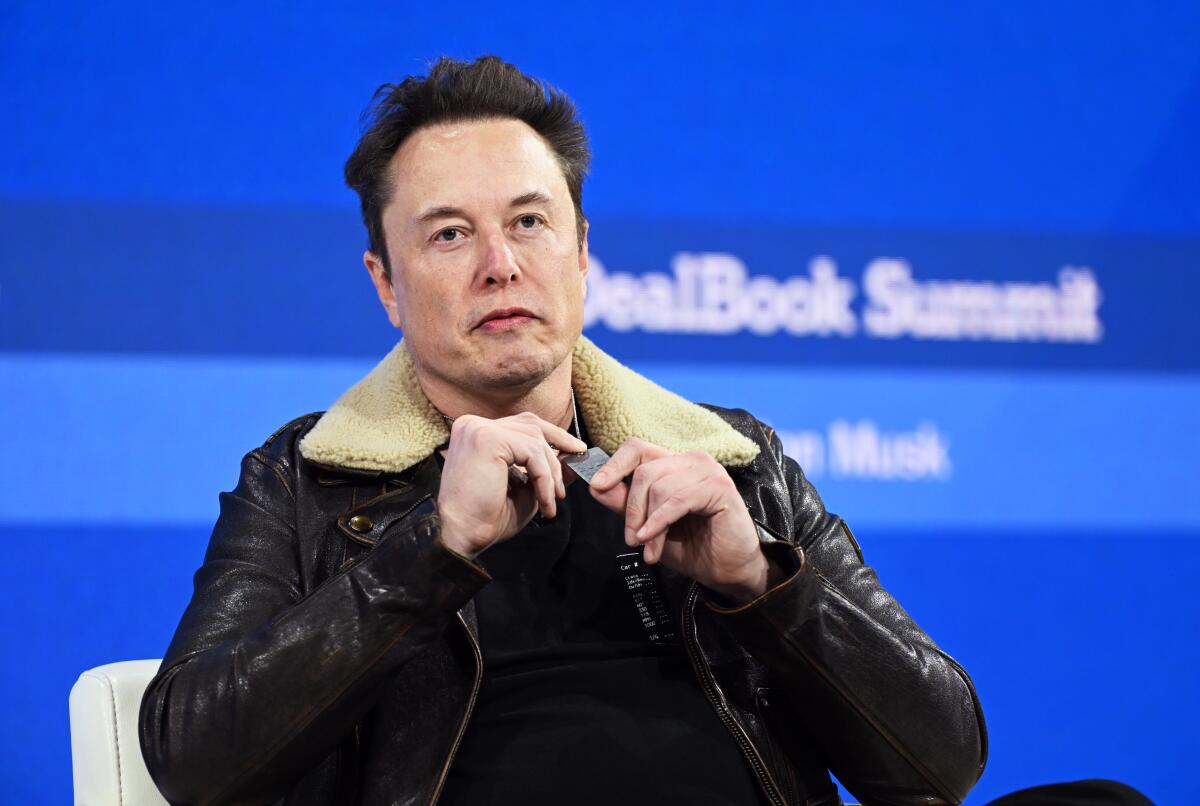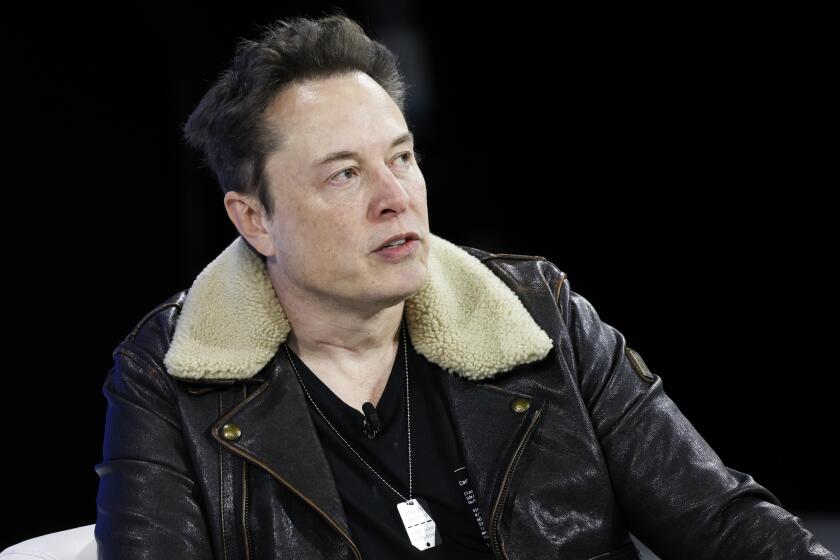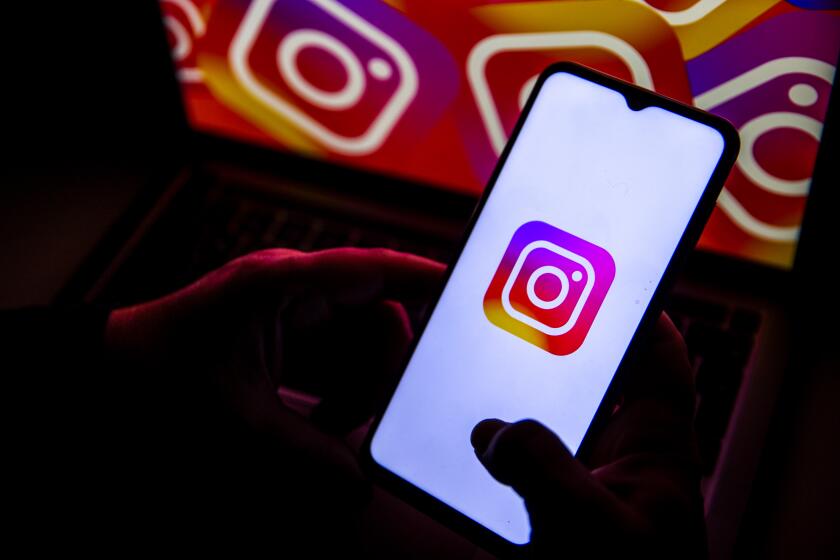Column: Why Elon Musk, the bully, is seen by many, including liberals, as a hero

- Share via
In the eyes of many Americans, Elon Musk is still a great man.
The myth often goes unquestioned by powerful men with access to him: be it his biographer Walter Isaacson or interviewer Andrew Ross Sorkin at last week’s New York Times DealBook Summit conference.
“I’ve done more for the environment than everyone — than any single human on Earth,” Musk said at the conference, where he told advertisers fleeing his social media platform X, once Twitter, “Go f— yourself.”
Opinion Columnist
Jean Guerrero
Jean Guerrero is the author, most recently, of “Hatemonger: Stephen Miller, Donald Trump and the White Nationalist Agenda.”
Sorkin didn’t challenge Musk’s claim, although electric cars made by his company Tesla have a much bigger carbon footprint than once believed, according to the company’s disclosures this year. And experts worry that rocket launches, including those of Musk’s SpaceX, may be changing the planet’s atmosphere and hurting sensitive habitats.
Regardless of whether Musk has helped or harmed the Earth, dozens of major brands paused advertising on X after he posted his agreement with a white supremacist and antisemitic comment on the platform. As his company bled advertising revenue, Musk did damage control, traveling to Israel and apologizing for his post. But then he seemed to double down.
“What I care about is the reality of goodness, not the perception of it,” Musk said. “And what I see all over the place is people who care about looking good, while doing evil. F— them.”
Tesla CEO Elon Musk spoke on accusations of antisemitism, the Cybertruck, OpenAI and more in a lengthy interview with DealBook’s Andrew Ross Sorkin.
It was a riveting, self-pitying performance. If Musk wants to be judged by his deeds, then it should matter that he is transforming a major social media platform into a racist cesspool. It should matter that he went to the U.S.-Mexico border to scaremonger about immigrants, and that his companies face multiple lawsuits alleging horrible acts of racist discrimination.
It should matter that Musk, who claims he’s a free speech absolutist, has suspended the accounts of journalists who were critical of him, complied with censorship requests from foreign governments and filed lawsuits against two watchdog groups, Media Matters for America and the Center for Countering Digital Hate, that reported on the spread of hate on X.
He claims he’s about transparency, but he’s suing California over a state law requiring social media companies to be more transparent. He claims to value truth, but he repeatedly boosts debunked conspiracy theories.
Without social media to occupy me at all times, my mind went empty: gloriously empty, with space for nature and new ideas. It was exhilarating.
Why, then, does the perception of Musk as a hero endure, including among liberals and independents who forgive his right-wing antics?
Where critics see an erratic megalomaniac, fans see a visionary working toward our long-term survival.
Yahaira Cueva, a 27-year-old electrical engineer in Austin, Texas, told me she doesn’t agree with everything Musk says, but she sees him as a powerful role model for persevering through adversity and opposition, including a difficult childhood. “Whenever I’m wanting to do things that seem very much out of reach, he’s a really good example to me,” she said.
Salina Marie Gomez, a 44-year-old writer in Denver who identifies as an independent, found hope in Musk’s story after her 2017 suicide attempt. She told the Verge that while reading his tweets and watching his videos during her recovery, she realized she had been too focused on “what humanity has been doing wrong, and not what we’ve been doing right.”
The current fad for ‘longtermism’ reminds me of my teen wish for digital immortality. It didn’t end well.
She was later turned off by Musk’s threats to sue the Anti-Defamation League. But after his visit to Israel, she chose to see the good again. “I think he’s just a really capable human being with a disposition toward being militant, which makes him really, really successful,” she told me.
In a world filled with negativity, Musk’s admirers are trying to see him in a positive light: If he weren’t such a bully, perhaps he wouldn’t be able to send humanity to other planets or save the Earth from climate change.
Elio Morillo, author of “The Boy Who Reached for the Stars,” a memoir about his journey from Ecuador to NASA, understands the awe that people like Musk can inspire. But he pushes back against Musk’s glorification. After interning at SpaceX, Morillo, a 30-year-old L.A.-based engineer, came to strongly believe that Musk’s team was responsible for the company’s great feats — not Musk. “If Elon were to disappear, SpaceX would be fine,” Morillo told me.
Musk’s achievements would, of course, be impossible without other people. But among his fans, including Isaacson, Musk’s singular greatness is assumed.
Indeed, that assumption is “the raison d’etre for the book itself,” Brian Merchant, The Times’ technology columnist, wrote in a review of Isaacson’s book. The author, Merchant notes, failed to explore “the most difficult and pressing questions,” such as the societal costs of Musk’s businesses and behavior.
In searching Isaacson’s book for insights about Musk’s character, I was struck by accounts of the harrowing abuse Musk endured as a child, including physical assaults at school.
“Over the years, whenever he was in a dark place or felt threatened, it took him back to the horrors of being bullied on the playground. Now he had the chance to own the playground,” Isaacson wrote, referring to Musk’s acquisition of Twitter, “the world’s ultimate playground.”
But the worst abuse came from Musk’s father. According to Musk’s brother, their father sometimes forced them to “just stand there” as he subjected them to hours of “scarring and evil comments.” Isaacson traces some parallels between Musk and his father, observing that the billionaire often went into a “demon mode.” But he doesn’t question Musk’s toughen-up-and-take-it attitude, which he exhibits most often on X. Instead, Isaacson frames his dark side as integral to his success.
That narrative frame is practically a cliche, so often is it used to excuse the misbehavior of “great men.” It’s one of popular culture’s most insidious ideas. As long as we believe it, we’ll keep elevating bullies like Musk.
More to Read
A cure for the common opinion
Get thought-provoking perspectives with our weekly newsletter.
You may occasionally receive promotional content from the Los Angeles Times.















